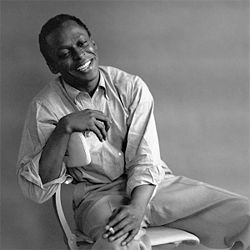Difference between revisions of "Template: Featured article 05 26" - New World Encyclopedia
From New World Encyclopedia
| Line 1: | Line 1: | ||
{{Main page article box| | {{Main page article box| | ||
type=Featured| | type=Featured| | ||
| − | title= | + | title=Miles Davis| |
| − | image_name= | + | image_name=Miles Davis by Palumbo.jpg| |
| − | image_desc= | + | image_desc=[[Jazz]] musician Miles Davis| |
| − | text= | + | text='''Miles Dewey Davis III''' (May 26, 1926 – September 28, 1991) was one of the most distinguished [[jazz]] musicians of the latter half of the twentieth century. A trumpeter, band leader, and composer, Davis was at the forefront of almost every major development in jazz from [[World War II]] to the 1990s. He played on some early [[bebop]] records and recorded the first cool jazz records. He was partially responsible for the development of modal jazz, and jazz fusion arose from his work with other musicians in the late 1960s and early 1970s. His sound recordings, along with the live performances of his many influential bands, were vital in jazz's acceptance as music with lasting artistic value. As an increasingly well-paid and fashionably-dressed jazz musician, Davis was also a symbol of jazz music's commercial potential.}} |
| − | |||
| − | |||
Revision as of 18:00, 13 November 2021
Featured Article: Miles Davis

Jazz musician Miles Davis